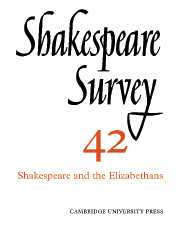Book contents
- Frontmatter
- ‘Jack hath not Jill’: Failed Courtship in Lyly and Shakespeare
- Truth and Art in History Plays
- Chronicles and Mythmaking in Shakespeare’s Joan of Arc
- King John and Embarrassing Women
- Golding’s Ovid, Shakespeare’s ‘Small Latin’, and the Real Object of Mockery in ‘Pyramus and Thisbe’
- Ovid and the Sonnets; or, did Shakespeare Feel the Anxiety of Influence?
- The Play of Sir Thomas More and Some Contemporary Events
- ‘Nobody’s Perfect’: Actors’ Memories and Shakespeare’s Plays of the 1590s
- The Boyhood of Shakespeare’s Heroines
- Shakespeare’s ‘Brawl Ridiculous’
- Shakespeare’s Handwriting
- Shakespeare Performances in England, 1987–8
- Professional Shakespeare Productions in the British Isles, January-December 1987
- The Year's Contributions to Shakespearian Study 1 Critical Studies
- 2 Shakespeare’s Life, Times, and Stage
- 3 Editions and Textual Studies
- Books Received
- Index
Golding’s Ovid, Shakespeare’s ‘Small Latin’, and the Real Object of Mockery in ‘Pyramus and Thisbe’
Published online by Cambridge University Press: 28 March 2007
- Frontmatter
- ‘Jack hath not Jill’: Failed Courtship in Lyly and Shakespeare
- Truth and Art in History Plays
- Chronicles and Mythmaking in Shakespeare’s Joan of Arc
- King John and Embarrassing Women
- Golding’s Ovid, Shakespeare’s ‘Small Latin’, and the Real Object of Mockery in ‘Pyramus and Thisbe’
- Ovid and the Sonnets; or, did Shakespeare Feel the Anxiety of Influence?
- The Play of Sir Thomas More and Some Contemporary Events
- ‘Nobody’s Perfect’: Actors’ Memories and Shakespeare’s Plays of the 1590s
- The Boyhood of Shakespeare’s Heroines
- Shakespeare’s ‘Brawl Ridiculous’
- Shakespeare’s Handwriting
- Shakespeare Performances in England, 1987–8
- Professional Shakespeare Productions in the British Isles, January-December 1987
- The Year's Contributions to Shakespearian Study 1 Critical Studies
- 2 Shakespeare’s Life, Times, and Stage
- 3 Editions and Textual Studies
- Books Received
- Index
Summary
In an influential article some years ago on Shakespeare's method in 'Pyramus and Thisbe', Kenneth Muir claimed it was the playwright's purpose to mock earlier Elizabethan writers who had treated the story awkwardly and clumsily. Muir saw Thomas Mouffet as Shakespeare's main quarry, but prominent among the other writers to whom he referred was Arthur Golding. Since Muir wrote, editors of A Midsummer Night's Dream, sceptical about Mouffet's part in the proceedings, have increasingly tended to read the burlesque as a parody of Golding's translation: R. A. Foakes in his New Cambridge edition, for example, is convinced that it is based on 'the story as told in Golding', and Harold Brooks, the Arden editor of the play, also has no doubt that' “Pyramus and Thisbe” is patently from Golding's version in his translation of Ovid's Metamorphoses.' Yet there is reason for unease with this situation. Although constantly referred to incidentally by editors and critics, Shakespeare's use of Golding has never received specific attention and is itself somewhat problematic. Neither the extent nor the precise nature of the debt to the translator has ever been accurately gauged, a point emphasized recently by the case of Titus Andronicus.
- Type
- Chapter
- Information
- Shakespeare Survey , pp. 53 - 64Publisher: Cambridge University PressPrint publication year: 1990
- 2
- Cited by

